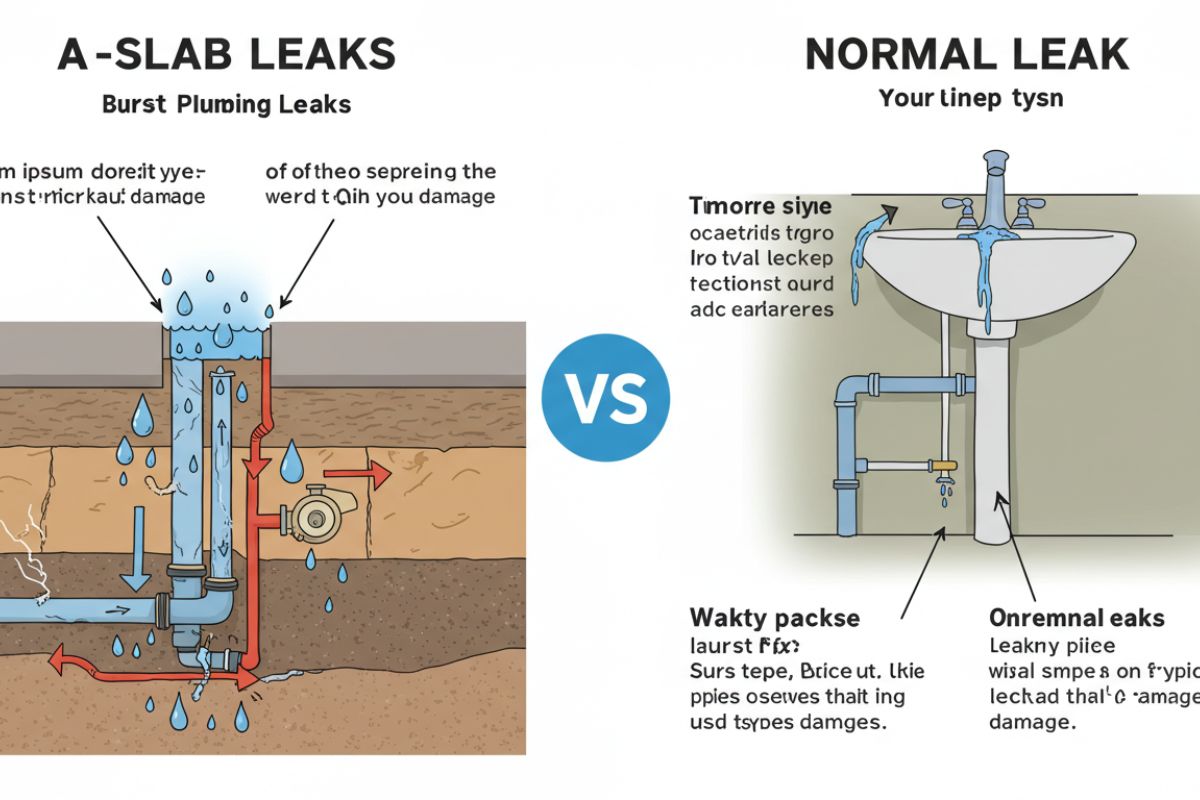Slab Leak vs. Normal Plumbing Leak: What’s the Difference?
Understanding Slab Leak Detection in Edmond and Why It’s Not Just Another Drip

When I first heard the term slab leak, I thought it was just plumber-speak for a bad day. But after dealing with one in my own home, I quickly realized that slab leaks are in a league of their own and very different from your everyday plumbing issue. If you’ve ever wondered how a slab leak differs from a normal leak, you’re in the right place. Let’s break it down together.
What Is a Slab Leak, Anyway?
In simple terms, a slab leak happens when a pipe underneath your home’s concrete foundation (aka the “slab”) cracks, bursts, or corrodes. It’s sneaky, it’s silent, and it can cause serious structural damage before you even know it’s there.
In my experience, I only noticed something was wrong when the floor felt oddly warm in one room and my water bill spiked. I thought my teenager had discovered a hidden hot tub. Nope, just a hot water slab leak!
Why Choose Slab Leak Detection?
When it comes to leaks, not all plumbing problems are created equal—and that’s especially true with slab leaks. Choosing slab leak detection isn’t just a precaution; it’s a proactive way to protect your home from hidden, costly damage.
In my case, I waited too long, thinking it was a minor issue. By the time I brought in a professional for slab leak detection in Edmond, my repair costs had doubled. Lesson learned!
Here’s why I strongly recommend opting for slab leak detection at the first sign of trouble:
-
Early Detection Saves Thousands: The longer a slab leak goes unnoticed, the more damage it causes. Quick detection can prevent cracked foundations, mold growth, and water-damaged flooring.
-
It Targets the Problem at Its Source: Unlike surface-level plumbing checks, slab leak detection uses advanced tools (like acoustic listening devices and thermal imaging) to pinpoint the exact location of the leak beneath your concrete slab.
-
Peace of Mind: Knowing your foundation is safe? That’s priceless. Slab leaks are serious business, and having the right professionals handle it gives you confidence your home’s structural integrity is protected.
How Is That Different From a Regular Plumbing Leak?
Great question. A normal plumbing leak typically occurs above ground—in walls, under sinks, or around appliances. These are much easier to spot (and fix). You’ll likely see water stains, puddles, or hear that telltale drip-drip-drip.
With slab leaks, there’s no visible mess—until there is. Think cracks in your flooring, moldy smells, or a mysterious drop in water pressure. That’s when I knew it was time to call in a professional for slab leak detection in Edmond.
Tips to Tell the Difference
-
Watch for silent signs: Warm spots on the floor, foundation cracks, or rising water bills.
-
Use your nose: Musty odors can mean water is trapped under the slab.
-
Listen to your pipes: A constant sound of running water when everything’s off? Big red flag.
Helpful Tips for Homeowners
-
Don’t delay: Slab leaks don’t fix themselves—they get worse.
-
Hire local pros: If you’re in Oklahoma like me, I highly recommend scheduling a slab leak detection in Edmond as soon as something feels off.
-
Keep your records: Insurance claims may need proof, so snap photos and jot notes.
Common Mistakes to Avoid
-
Ignoring early signs (guilty).
-
Trying DIY slab leak repairs (just… don’t).
-
Not comparing estimates from multiple plumbers.
FAQs: Slab Leak Detection & More
Q: How do I know if I have a slab leak or just a normal leak?
A: Slab leaks are often hidden. If you notice warm spots, higher bills, or damp flooring with no visible source, it’s likely under the slab.
Q: Is slab leak detection expensive in Edmond?
A: It can vary, but early detection is always cheaper than full foundation repair. Local companies often offer free consultations.
Q: Can slab leaks damage my foundation?
A: Absolutely. Left untreated, they can cause cracks, mold, and even shift your home’s structure.
Q: How long does slab leak repair take?
A: Depends on the severity. Some can be fixed in a day, others may take longer if rerouting is needed.
Q: Can slab leaks be prevented?
A: While not 100% preventable, you can reduce the risk. Regular plumbing maintenance, checking water pressure levels, and installing a water softener in areas with hard water (like Edmond) all help.
Q: What causes slab leaks in the first place?
A: Several things—shifting soil, poor pipe installation, corrosion, or even vibrations from water flow over time. In older homes, the risk is higher due to aging copper or galvanized steel pipes.
Q: Will my homeowners insurance cover slab leak repairs?
A: It depends on your policy. Most insurance will cover damage caused by the leak, but not the cost to fix the pipe itself. Always check your policy and talk to your agent—before you have a leak.




